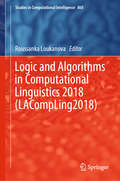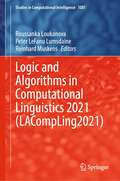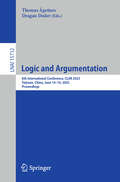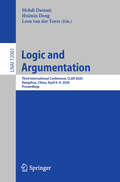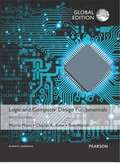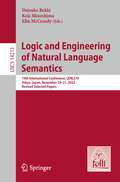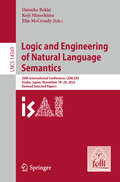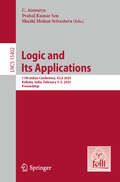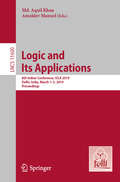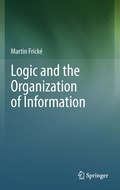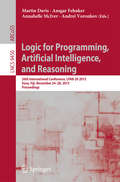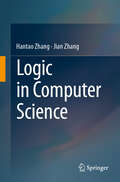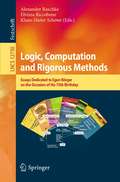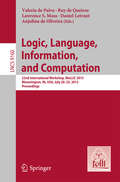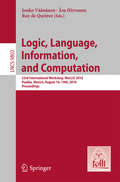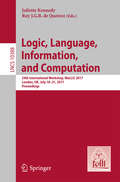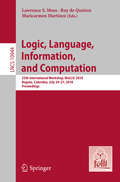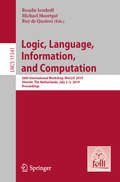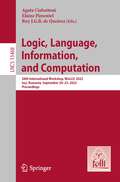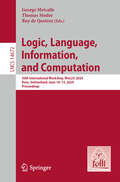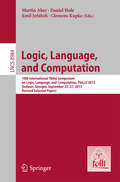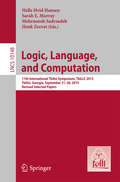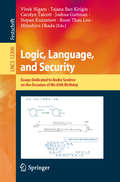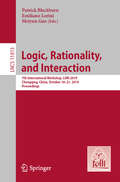- Table View
- List View
Logic and Algorithms in Computational Linguistics 2018 (Studies in Computational Intelligence #860)
by Roussanka LoukanovaThis book focuses mainly on logical approaches to computational linguistics, but also discusses integrations with other approaches, presenting both classic and newly emerging theories and applications.Decades of research on theoretical work and practical applications have demonstrated that computational linguistics is a distinctively interdisciplinary area. There is convincing evidence that computational approaches to linguistics can benefit from research on the nature of human language, including from the perspective of its evolution.This book addresses various topics in computational theories of human language, covering grammar, syntax, and semantics. The common thread running through the research presented is the role of computer science, mathematical logic and other subjects of mathematics in computational linguistics and natural language processing (NLP). Promoting intelligent approaches to artificial intelligence (AI) and NLP, the book is intended for researchers and graduate students in the field.
Logic and Algorithms in Computational Linguistics 2021 (Studies in Computational Intelligence #1081)
by Reinhard Muskens Roussanka Loukanova Peter LeFanu LumsdaineThis book assesses the place of logic, mathematics, and computer science in present day, interdisciplinary areas of computational linguistics. Computational linguistics studies natural language in its various manifestations from a computational point of view, both on the theoretical level (modeling grammar modules dealing with natural language form and meaning and the relation between these two) and on the practical level (developing applications for language and speech technology). It is a collection of chapters presenting new and future research. The book focuses mainly on logical approaches to computational processing of natural language and on the applicability of methods and techniques from the study of formal languages, programming, and other specification languages. It presents work from other approaches to linguistics, as well, especially because they inspire new work and approaches.
Logic and Argumentation: 6th International Conference, CLAR 2025, Taiyuan, China, June 14–16, 2025, Proceedings (Lecture Notes in Computer Science #15712)
by Thomas Ågotnes Dragan DoderThis book constitutes the refereed proceedings of the 6th International Conference on Logic and Argumentation, CLAR 2025, held in Taiyuan, China, during June 14–16, 2025. The 22 full papers included in this book were carefully reviewed and selected from 38 submissions. These papers focus on the recent advancements in the field of logic and argumentation, as well as their applications in various areas of Artificial intelligence (AI), such as explainable AI, ethical dilemmas, reasoning about uncertainty and knowledge representation.
Logic and Argumentation: Third International Conference, CLAR 2020, Hangzhou, China, April 6–9, 2020, Proceedings (Lecture Notes in Computer Science #12061)
by Mehdi Dastani Huimin Dong Leon van der TorreThis book constitutes the refereed proceedings of the Third International Conference on Logic and Argumentation, CLAR 2020, held in Hangzhou, China, in April 2020. The 14 full and 7 short papers presented were carefully reviewed and selected from 31 submissions. The papers cover the focus of the CLAR series, including formal models of argumentation, logics for decision making and uncertainreasoning, formal models of evidence, con rmation, and justi cation, logics forgroup cognition and social network, reasoning about norms, formal representationsof natural language and legal texts, as well as applications of argumentationon climate engineering.
Logic and Computer Design Fundamentals
by Charles R. Kime Tom Martin M. Morris ManoFor courses in Logic and Computer design. Understanding Logic and Computer Design for All Audiences Logic and Computer Design Fundamentals is a thoroughly up-to-date text that makes logic design, digital system design, and computer design available to students of all levels. The Fifth Edition brings this widely recognized source to modern standards by ensuring that all information is relevant and contemporary. The material focuses on industry trends and successfully bridges the gap between the much higher levels of abstraction students in the field must work with today than in the past. Broadly covering logic and computer design, Logic and Computer Design Fundamentals is a flexibly organized source material that allows instructors to tailor its use to a wide range of student audiences.
Logic and Engineering of Natural Language Semantics: 19th International Conference, LENLS19, Tokyo, Japan, November 19–21, 2022, Revised Selected Papers (Lecture Notes in Computer Science #14213)
by Daisuke Bekki Koji Mineshima Elin McCreadyThis volume LNCS 14213 constitutes the refereed proceedings of the 19th International Conference, LENLS 2019, held in November 2022, in Tokyo, Japan. The 13 full papers presented were carefully reviewed and selected from 34 submissions. The conference focuses on theoretical and computational linguistics covering topics ranging from syntax, semantics, and pragmatics to the philosophy of language and natural language processing.
Logic and Engineering of Natural Language Semantics: 20th International Conference, LENLS20, Osaka, Japan, November 18–20, 2023, Revised Selected Papers (Lecture Notes in Computer Science #14569)
by Daisuke Bekki Koji Mineshima Elin McCreadyThis book constitutes the refereed post-conference proceedings of the 20th International Conference, LENLS20, held in Osaka, Japan, during November 18-20, 2023. The 19 full papers presented were carefully reviewed and selected from 46 submissions. The conference aims to cover the topics at the Intersection of Language and logic, and so Centers Around Linguistics, both Theoretical and Computational; Logic; Philosophy; and other sorts of Formal Approaches to these topics such as Game Theory.
Logic and Its Applications: 11th Indian Conference, ICLA 2025, Kolkata, India, February 3–5, 2025, Proceedings (Lecture Notes in Computer Science #15402)
by Shashi Mohan Srivastava C. Aiswarya Prabal Kumar SenThis book constitutes the refereed proceedings of the 11th Indian Conference on Logic and Its Applications, ICLA 2025, held in Kolkata, India, during February 3–5, 2025. Four out the five invited talks are included in this book. Out of the 26 submissions, the program committee carefully selected 14 papers to be included in the proceedings. The topics included are Mathematics, Computer Science, Philosophy, Linguistics and Cognitive Science. A special feature of ICLA is the inclusion of studies in systems of logic in the Indian tradition, as well as historical research on logic.
Logic and Its Applications: 8th Indian Conference, ICLA 2019, Delhi, India, March 1-5, 2019, Proceedings (Lecture Notes in Computer Science #11600)
by Md. Aquil Khan Amaldev ManuelThis book collects the refereed proceedings of the 8th Indian Conference on Logic and Its Applications, ICLA 2019, held in Delhi, India, in March 2019. The volume contains 13 full revised papers along with 6 invited talks presented at the conference. The aim of this conference series is to bring together researchers from a wide variety of fields in which formal logic plays a significant role. Areas of interest include mathematical and philosophical logic, computer science logic, foundations and philosophy of mathematics and the sciences, use of formal logic in areas of theoretical computer science and artificial intelligence, logic and linguistics, and the relationship between logic and other branches of knowledge. Of special interest are studies in systems of logic in the Indian tradition, and historical research on logic.
Logic and the Organization of Information
by Martin FrickéLogic and the Organization of Information closely examines the historical and contemporary methodologies used to catalogue information objects--books, ebooks, journals, articles, web pages, images, emails, podcasts and more--in the digital era. This book provides an in-depth technical background for digital librarianship, and covers a broad range of theoretical and practical topics including: classification theory, topic annotation, automatic clustering, generalized synonymy and concept indexing, distributed libraries, semantic web ontologies and Simple Knowledge Organization System (SKOS). It also analyzes the challenges facing today's information architects, and outlines a series of techniques for overcoming them. Logic and the Organization of Information is intended for practitioners and professionals working at a design level as a reference book for digital librarianship. Advanced-level students, researchers and academics studying information science, library science, digital libraries and computer science will also find this book invaluable.
Logic for Programming, Artificial Intelligence, and Reasoning
by Martin Davis Andrei Voronkov Ansgar Fehnker Annabelle MciverThis book constitutes the proceedings of the 20thInternational Conference on Logic for Programming, Artificial Intelligence, andReasoning, LPAR-20, held in November 2015, in Suva, Fiji. The 43 regular papers presented together with 1 invitedtalk included in this volume were carefully reviewed and selected from 92submissions. The series of International Conferences on Logic for Programming,Artificial Intelligence and Reasoning, LPAR, is a forum where, year after year,some of the most renowned researchers in the areas of logic, automatedreasoning, computational logic, programming languages and their applicationscome to present cutting-edge results, to discuss advances in these fields, andto exchange ideas in a scientifically emerging part of the world.
Logic in Computer Science
by Jian Zhang Hantao ZhangMathematical logic is an important basis for mathematics, computer science and artificial intelligence alike. This book provides a comprehensive introduction to various logics, including classical propositional logic and first-order predicate logic, as well as equational logic, temporal logic, and Hoare logic. In addition, it presents proof procedures for classical logics and decision procedures for checking the satisfiability of logical formulas. The book assumes no background in logic. It presents logics as practical tools for solving various problems in artificial intelligence and formal verification. Accordingly, it is well suited for (junior and senior) undergraduate and graduate students majoring in computer science or mathematics. Each chapter includes roughly a dozen exercise problems, so as to help the reader understand the concepts and techniques discussed.
Logic in Computer Science: Modelling and Reasoning about Systems
by Mark Ryan Michael HuthIn recent years, powerful tools for verifying hardware and software systems have been developed. Major companies, such as Intel, Siemens, BT, AT & T, and IBM have increasingly become interested in that technology. Students need a basic formal training that allows them to gain sufficient proficiency in using logic-based verification methods. This book addresses these needs by providing a sound basis in logic and an introduction to the logical frameworks used in modeling, specifying and verifying computer systems. Coverage provides a simple and clear presentation, detailing propositional and predicate logic as well as some specialized logics used for reasoning about the correctness of computer systems. The authors introduce a carefully chosen core of essential terminology; further technicalities are introduced only where they are required by the applications. Numerous examples are given, as well as a full exposition of a fast-growing technique for modeling and verifying computer systems, known as symbolic model checking. It will be an ideal introduction for undergraduate students. A worldwide web tutorial that supports the course activities and provides solutions to the sample exercises is available to instructors.
Logic, Computation and Rigorous Methods: Essays Dedicated to Egon Börger on the Occasion of His 75th Birthday (Lecture Notes in Computer Science #12750)
by Klaus-Dieter Schewe Alexander Raschke Elvinia RiccobeneThis Festschrift was published in honor of Egon Börger on the occasion of his 75th birthday.It acknowledges Prof. Börger's inspiration as a scientist, author, mentor, and community organizer. Dedicated to a pioneer in the fields of logic and computer science, Egon Börger's research interests are unusual in scope, from programming languages to hardware architectures, software architectures, control systems, workflow and interaction patterns, business processes, web applications, and concurrent systems.The 18 invited contributions in this volume are by leading researchers in the areas of software engineering, programming languages, business information systems, and computer science logic.
Logic, Language, Information, and Computation
by Valeria De Paiva Ruy De Queiroz Lawrence S. Moss Daniel Leivant Anjolina G. de OliveiraEdited in collaboration with FoLLI, the Association of Logic, Language and Information this book constitutes the refereed proceedings of the 22nd Workshop on Logic, Language, Information and Computation, WoLLIC 2015, held in the campus of Indiana University, Bloomington, IN, USA in July 2015. The 14 contributed papers, presented together with 8 invited lectures and 4 tutorials, were carefully reviewed and selected from 44 submissions. The focus of the workshop was on interdisciplinary research involving formal logic, computing and programming theory, and natural language and reasoning.
Logic, Language, Information, and Computation
by Jouko Väänänen Ruy De Queiroz Åsa HirvonenThis volume contains the papers presented at WoLLIC 2010: 17th Workshop on Logic, Language, Information and Computation held during July 6-9, 2010, on the campus of Universidade de Bras´ ?lia (UnB), Brazil. The Workshop on Logic, Language, Information and Computation (WoL- LIC) is an annual event, meeting every year since 1994, which aims at fostering interdisciplinary research in pure and applied logic. The idea is to have a forum which is large enough in the number of possible interactions between logic and the sciences related to information and computation, and yet is small enough to allow for concrete and useful interaction among participants. The present volume contains 13 contributed papers that were selected from among 32 submissions after a rigorous review by the Program Committee. Each submission was reviewed by at least two, and on average three, Program C- mittee members. This volume also containspapersor abstractsthat relateto the seven invited talks presented at the workshop. Between them, these papers give a snapshot of some fascinating work taking place at the frontiers between computation, logic, and linguistics. We are grateful to all the people who made this meeting possible and are responsible for its success: the members of the Program Committee and the external reviewers, the invited speakers, the contributors, and the people who were involved in organizing the workshop.
Logic, Language, Information, and Computation
by Juliette Kennedy Ruy J. G. B. QueirozEdited in collaboration with FoLLI, the Association of Logic, Language and Information this book constitutes the refereed proceedings of the 21st Workshop on Logic, Language, Information and Communication, WoLLIC 2014, held in Valparaiso, Chile, in September 2014. The 15 contributed papers presented together with 6 invited lectures were carefully reviewed and selected from 29 submissions. The focus of the workshop was on the following subjects Inter-Disciplinary Research involving Formal Logic, Computing and Programming Theory, and Natural Language and Reasoning.
Logic, Language, Information, and Computation: 25th International Workshop, WoLLIC 2018, Bogota, Colombia, July 24-27, 2018, Proceedings (Lecture Notes in Computer Science #10944)
by Ruy De Queiroz Lawrence S. Moss Maricarmen MartinezEdited in collaboration with FoLLI, the Association of Logic, Language and Information this book constitutes the refereed proceedings of the 25th Workshop on Logic, Language, Information and Communication, WoLLIC 2018, held inBogota, Colombia, in July 2018. The 16 full papers together with 3 short papers and 3 invited talks presented were fully reviewed and selected from 30 submissions. The vision for the conference is to provide an annual forum which is large enough to provide meaningful interactions between logic and the sciences related to information and computation.
Logic, Language, Information, and Computation: 26th International Workshop, WoLLIC 2019, Utrecht, The Netherlands, July 2-5, 2019, Proceedings (Lecture Notes in Computer Science #11541)
by Ruy De Queiroz Rosalie Iemhoff Michael MoortgatEdited in collaboration with FoLLI, the Association of Logic, Language and Information this book constitutes the refereed proceedings of the 26th Workshop on Logic, Language, Information and Communication, WoLLIC 2019, held in Utrecht, The Netherlands, in July 2019. The 41 full papers together with 6 invited lectures presented were fully reviewed and selected from 60 submissions. The idea is to have a forum which is large enough in the number of possible interactions between logic and the sciences related to information and computation, and yet is small enough to allow for concrete and useful interaction among participants.
Logic, Language, Information, and Computation: 28th International Workshop, WoLLIC 2022, Iași, Romania, September 20–23, 2022, Proceedings (Lecture Notes in Computer Science #13468)
by Agata Ciabattoni Elaine Pimentel Ruy J. G. B. de QueirozEdited in collaboration with FoLLI, the Association of Logic, Language and Information this book constitutes the refereed proceedings of the 28th Workshop on Logic, Language, Information and Computation, WoLLIC 2022, Iasi, Romania, in September 2022. The 25 full papers presented included with 8 extra abstracts, 5 invited talks and 3 tutorials were fully reviewed and selected from 46 submissions. The conference aims fostering interdisciplinary research in pure and applied logic.
Logic, Language, Information, and Computation: 30th International Workshop, WoLLIC 2024, Bern, Switzerland, June 10–13, 2024, Proceedings (Lecture Notes in Computer Science #14672)
by Thomas Studer Ruy De Queiroz George MetcalfeEdited in collaboration with FoLLI, the Association of Logic, Language and Information this book constitutes the refereed proceedings of the 30th International Workshop on Logic, Language, Information, and Computation, WoLLIC 2024, held in Bern, Switzerland, during June 10–13, 2024. The 18 full papers included in this book were carefully reviewed and selected from 37 submissions. This book also contains six invited abstracts. The WoLLIC conference series aims at fostering interdisciplinary research in pure and applied logic.
Logic, Language, and Computation
by Martin Aher Daniel Hole Emil Jeřábek Clemens KupkeThis book constitutes the refereed proceedings of the 10th International Tbilisi Symposium on Logic, Language and Computation, TbiLLC 2013, held in Gudauri, Georgia, in September 2013. The conference series is centered around the interaction between logic, language and computation. The contributions represent these three fields and the symposia aim to foster interaction between them. The book consists of 16 papers that were carefully reviewed and selected from 26 submissions. Each paper has passed through a rigorous peer-review process before being accepted for publication. The volume also contains two summaries of the tutorials that took place at the symposium: the one on admissible rules and the one on the formal semantics of aspectual meaning from a cross-linguistic perspective.
Logic, Language, and Computation
by Henk Zeevat Helle Hvid Hansen Sarah E. Murray Mehrnoosh SadrzadehThis book constitutes the refereed proceedings of the 11th International Tbilisi Symposium on Logic, Language and Computation, TbiLLC 2015, held in Tbilisi, Georgia, in September 2015. Initially there were 64 submissions, but 29 were actually presented of which 18 full papers have been accepted. The biennial conference series and the proceedings are representative of the aims of the organizing institutes: to promote the integrated study of logic, information and language. The scientific program consisted of tutorials, invited lectures, contributed talks, and two workshops.
Logic, Language, and Security: Essays Dedicated to Andre Scedrov on the Occasion of His 65th Birthday (Lecture Notes in Computer Science #12300)
by Carolyn Talcott Vivek Nigam Tajana Ban Kirigin Joshua Guttman Stepan Kuznetsov Boon Thau Loo Mitsuhiro OkadaThis Festschrift was published in honor of Andre Scedrov on the occasion of his 65th birthday. The 11 technical papers and 3 short papers included in this volume show the many transformative discoveries made by Andre Scedrov in the areas of linear logic and structural proof theory; formal reasoning for networked systems; and foundations of information security emphasizing cryptographic protocols. These papers are authored by researchers around the world, including North America, Russia, Europe, and Japan, that have been directly or indirectly impacted by Andre Scedrov. The chapter “A Small Remark on Hilbert's Finitist View of Divisibility and Kanovich-Okada-Scedrov's Logical Analysis of Real-Time Systems” is available open access under a CC BY 4.0 license at link.springer.com.
Logic, Rationality, and Interaction: 7th International Workshop, LORI 2019, Chongqing, China, October 18–21, 2019, Proceedings (Lecture Notes in Computer Science #11813)
by Patrick Blackburn Emiliano Lorini Meiyun GuoThis LNCS book is part of the FOLLI book series and constitutes the proceedings of the 7th International Workshop on Logic, Rationality, and Interaction, LORI 2019, held in Chongqing, China, in October 2019.The 31 papers presented in this book were carefully reviewed and selected from 56 submissions. They focus on the following topics: agency; argumentation and agreement; belief revision and belief merging; belief representation; cooperation; decision making and planning; natural language; philosophy and philosophical logic; and strategic reasoning.
